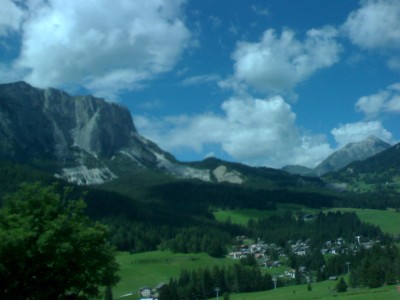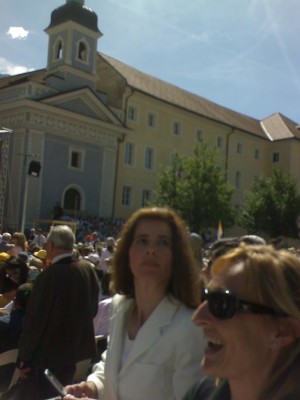 newsitems
newsitems
newsitems
EU Parliament President Buzek to EuroFora:EU Global partner in E.Mediteranean for Egypt/Tunis+Energy
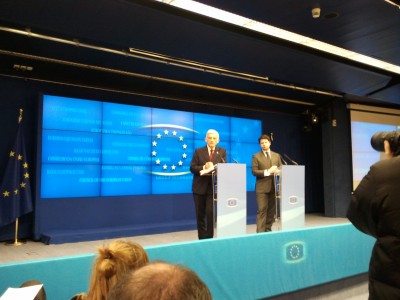
*Brussels/Angelo Marcopolo/- EU as Global Partner must have a Strategic presence also in South-Eastern Mediterranean, where Political developments on Egypt, Tunisia a.o. currently unfold, parallel to new Gas a.o. Energy findings and projects, replied in substance EU Parliament's President, Polish MEP Jerzy Buzek, to "EuroFora"'s Questions, at the opening of EU's 2011 Energy and Innovation Summit, which, making an U-turn, firmly supported, later-on, such GeoPolitical moves, both by a special Communiqué of EU Council's President Van Rompoy, and by strong statements from French President Sarkozy and German Chancellor Merkel at its conclusion.
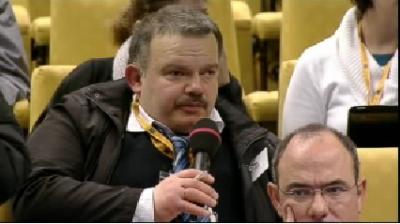
=> "Do you think that, in future, EU Parliament should approach Energy a.o. Raw Materials' developments in an integrated way, taking into account both Political, Foreign and Security/Defence Policy, and Democracy/Human Rights, as you said, together with -but not only- the Economic Factors ?", we asked Buzek.
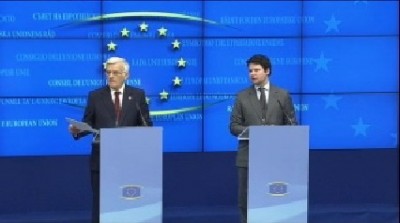
+ In "a 2nd, related Question", "EuroFora" noted that EU Commission's President "Barroso, and others (f.ex. Heads of State/Government), as well as your (Buzek's) own observations, highlighted the fact that, as it is well known, S/Eastern Mediterranean is a growing Energy (Gas) hub in the Future, close to the EU and partly European Land", (thanks to EU Member Cyprus).
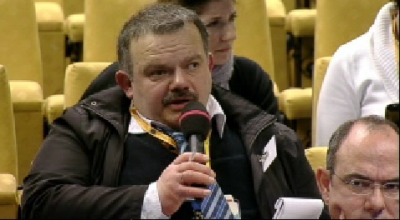
- Therefore, "don't you think that EU should be much more Present in that Area ?", we asked.
- "Of course, Energy issue is a most Important matter for the EU and for the whole World : It's a Global problem Today. We should have something like a Global response", at least "as far as the EU" is concerned, EU Parliament's President stressed from the outset in Reply to "EuroFora"s Questions.
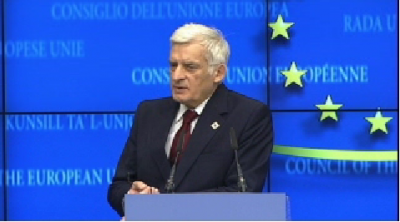
- So it is one of the, may be most important points in our European Energy Community : Coordination in our Joint Actions Outside of the EU, in purchasing Energy from our Foreign Suppliers", Buzek pointed out.
+ Uniting, in a strikingly simple and crystal-clear way, both EU Summit's official Agenda Items : Energy and Innovation, in relation with current developments in the Mediterranean, Buzek, (a former University Professor on Science, who was also EU's Rapporteur for the on-going 7th Research and Technology PluriAnnual Program), observed that "It's also connected, in this Specific Case that You mentioned, with the so-called "Mediterranean Ring" for both Electricity and Gas supply" :
- "We (EU) need such a Ring to deliver Solar Energy from Northern Africa in the Future, because it's not finished yet that big project, (i.e. "Desertec" for Solar energy production throughout all Sahara desert, and "TransGreen" for massive Transport overseas), and also to have a Free Suppy and Access to Gas, in all the Countries around the Mediterranean Sea", he explained.
- "So, it's very important, not only for the EU, but also for our Neighbours. And (therefore), it's also important for our Neighbourhood Policy :", he concluded.
+ Moreover, "if we think about the EU as a "Global Partner", and we'd like to be a very important player in G20+, G8, with USA, China, Russia, Brazil, India, and so on, let us (EU) be Well Organized in our .. Surroundings, and our ..Surroundings are our Neighbours".
-"F.ex., in the "Western Balkans, thanks to our (EU's) Initiative to open the gate for (EU) Membership, we could solve the problems : Our Soft Power became much Stronger, than Hard Power is in that region : They are no more fighting eachother ; they are trying to achieve Requirements for (EU's) Copenhagen Criteria", (on Human Rights, Democracy and Rule of Law, etc). So it's quite a New Spirit in this part of Europe", the experinced Polish poltician noted.
- "We (EU) have a similar approach, without, of course, talking about Enlargement, trying to influence the situation, in the Eastern part of the European Continent, in our Eastern Partenship, (which is) very important for us", Buzek s observed in addition.
+ "And it's similar in the Mediterannean Sea, towards our Neighbours" there" : F.ex. "Tunisia, (which) is just 300 km from Malta : very Close. (In fact, even closer to Italy : only 200 km, and already linked with an Algeria-EU Pipeline). And the same goes with Egypt and in the Middle East", (close to EU Member Cyprus), etc.
- "So, our Energy issue, our Energy Policy and Energy Agenda is also connected with our Neighbours : In the Eastern part of Europe, in Western Balkans, in the Mediterranean Sea", concluded EU Parliament's President, making, in reply to "EuroFora"s questions (See supra) a compehensive overview of EU's Strategy vis a vis its surrounding areas.
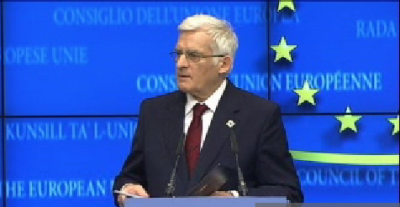
+ On this occasion, EU Parliament's President added, immediately afterwards, that, according to some "Worrying News", several "Human Rights Defenders were arrested today in the Mubarak International Centre in Kairo", including some working for "Human Rights Watch and Amnesty International", whose "whereabouts are (currently) unknown, and we (EU) are very much Worried about that. It's a new Bad Example (coming now) from Egypt", as he denounced. "We (EU) are worried about that. We must support Democracy and Civil Society in Egypt", Buzek concluded, before being strongly supported on that Press Freedom point also by subsequent statements of Sarkozy and Merkel (See infra).
----------------------------
Meanwhile, an impressive shift, in line with on-going Developments cited by "EuroFora"s Questions and EU Parliament President Jerzy Buzek's Replies (See supra), added to the Franco-German motor's call to boost €uroZone's Competitivity, was marked in EU Summit's overall focus :
- Initially, EU Council President, Herman Van Rompoy's "Opening Remarks" this Morning, briefly mentioned "Tunisia and Egypt" events (added at the last minute in the Draft Agenda) only at the End, long after "Energy", "Innovation", and "€uroZone's Financial problems", due to be "discussed over Luncheon".
- But, on the contrary, later this Evening, his concluding "Remarks ... Following the meeting of Heads of State or Government", focus right from the Start on "the Dramatic Events at Europe's Southern Borders", now mentioning only as "Second Topic" the "Energy and ..Innovation" issues, concluding by anouncing, in, addition to a scheduled "full Package in March" with measures on the "Economic Situation in Europe and in the €uroZone", also of the "17 €uroZone Countries"' "new" decision to advance towards "a stronger Economic Convergence, by working closer together in National Policies increasing Competitiveness", open also to other EU non-€uro countries.
---------------
- Speaking now in Larger terms, much more for all or most of "EU's Southern borders", Van Rompoy focused preferably on all "those Countries in the (Mediterranean) Region, which pursue Political and Economic Reforms", in "public squares where a Fight for Freedom is taking place, .. Close to us all", as he said.
- And he anounced EU's decision to "commit" itself in"to a New Partnership" with these countries, "determined to give the Union's full Support for a Democratic Transition, with Free and Fair Elections and respect for Human Rights and Pluralism", by "develop(ing) a Support Package for the Region", and rapidly adapt(ing) the instruments to promote Social and Economic Development in the Region".
---------------
+ Meanwhile, EU Summit made an unexpected, long "Declaration" both "on Egypt" and "on the (ider Mediterranean) Region", where it stresses, in conclusion, that "the EU is determined to lend its full Support to the Transition Processes (in plural) towards Democratic Governance, Pluralism, improved Opportunities for Economic Prosperity, Social Inclusion, and Regional Stability".
For that purpose, on Strategic Policy terms, EU "is comitted to a New Partenship, involving more effectice support in the Future to those Countries which are pursuing Political and Economic Reforms, including through the European Neighbourhood Policy (usually destinated towards Eastern areas), and the Union for the Mediterranean", (which was created during the French EU Chairmanship, by President Sarkozy, on July 2008 in Paris by a 37 Heads of State/Government strong Summit).
- "In this context", EU Heads of State/Government "invited the High Representative", Cathy Ashton, "withing the framework of this ("New") Partenership, to develop a Package of Measures aimed at lending EU support to the Transition and Transformation processes ..., and to link the European Neighbourhood Policy and Union for the Mediterranean more to those objectives", which include, in particular, the "strengthening of Democratic Institutions, promoting Democratic Governance and Social Justice, and assisting the preparation and conduct of Free and Fair Elections", (i.e. mainly Strasbourg-based Pan-European CoE's, but also Wienna-based OSCE's traditional business).
+ They also "invited the High Representative and the (EU) Commission to adapt Rapidly the Instruments of the EU, to make Humanitarian Aid available", but also in order to propose Measures and Projects to stimulate Cooperation, Exchange and Investment in the Region, with the aim of promoting Economic and Social Development".
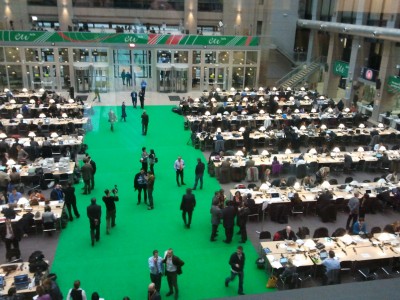
- Even more focused on the emergenece of a New EU Strategy for the whole Mediterranean Region, EU Summit's official Conclusions, "emphasize" that "Developments in the Mediterranean Region make it even more Urgent to respect previous Peace Agreements, and to achieve Rapid Progress in the Middle East Peace process", included.
For that purpose, EU Council, which sends for the 1st time its President, Herman Van Rompoy, to participate to the Security International Conference, tomorrow in Munich (Germany), where a Middle East "Quartet meeting" will also take place "on 5 February 2011", "expressed the expectation that (it) .. will make a substantive contribution".
In this overall context, some or most of 3rd Mediterranean Countries could Upgrade their EU links through a kind of "Adanced Status", as that which should be prepared now, f.ex., for "Tunisia" (a Country already closely linked to EU Member Italy via an Algeria-EU Pipeline, sas well as Morocco does through Spain) , EU Summit pointed out.
------------------------------
+ Inside the Larger framework EU's "Southern Borders" and/or of "the Region", cited 4 times, "Egypt" and/or Tunisia is mentioned 3 times [in Van Rompoy's concluding remarks], in order to express EU's "Deep Concern", "condemn Violence and Intimidation", and "call on the Egyptian Authorities to meet the aspirations of the Egyptioan People, with Reform, not Repression", so that "a...Transition should begin right now", as EU's President stressed, obviously avoiding external interference in Egypt's national affairs on the thorny issue whether Egyptian President Mubarak should leave after September's forthcoming Elections, or immediately now, as USA President Barack Obama was accused to have asked for. (See specific "EuroFora"s NewsReport on EU and Egypt+). ??? Cathy Ashton, EU's High Representative was "asked" to "convey these messages on her forthcoming Visit to Tunisia and Egypt", for which no date was fixed yet.
++ Expressing its "outmost Concern" for "the Deteriorating Situation in Egypt", EU Summit's special "Declaration on Egypt and the Region", (See supra), "condemned", meanwhile, "in the strongest terms, the Violence and all those who use and encourage Violence", from any side.
- "It Emphasized the Right of all Citizens to Demonstrate Freely and Peacefully, under due Protection from Law-Enforcement Authorities", declaring that "any attempt to Restrict the Free Flow of Information", such as "Aggression and Intimidation directed against Journalists and Human Rights Defenders, is Unacceptable". ..
... "All Parties should show Restraint and avoid further Violence, and Begin an Orderly Transition to a Broad-based Government. EU Council underlined that this Transition Process must start Now", (even if it might conclude later-on).
- "The Basis for the EU's relationship with Egypt must be the Principles set out in the Association Agreement and the Commitments made", EU recalled. In particular, EU "saluted the Peaceful and Dignified expression, by the Tunisian and Egyptian People of their Legitimate, Democratic, Economic and Social Aspirations, which are in accord with the Values the EU promotes for itself and throughout the World".
- EU Summit "emphasized that the Citizens' Democratic Aspirations should be addressed through Dialogue and Political Reform, with Full Respect to Human Rights and Fundamental Freedoms, and through Free and Fair Elections", "calling on All Parties to engage in a Meaningful Dialogue to that end".
----------------------------------------
EU on Egypt+ : Stick on Democratic Principles, without Foreign Interference
----------------------------------------------
+ Meanwhile, on the "hottest" issue of these days, EU Summit made it clear that Europe strongly supports respect of Democracy and Human Rights in Mediterranean Countries, as well as Economic Development prospects, but, unlike others, rejects Foreign Interferences inside their internal affairs :
- "Orderly" Transition to "a Broad-based Government", by a "Process" which "must Start now", on the "Basis" of "Principles" and "Values", "through meaningful Dialogue", so that People's "Voice" is heard, by meeting "the Peaceful and Dignified expression, by the Tunisian and Egyptian People of their Legitimate, Democratic, Economic and Social Aspirations", mainly thanks to the "preparation of Free and Fair Elections", are, indeed, main messages highlighted in EU Summit's official conclusions (cited supra), contrary to other attempts, reportedly by some in USA, Turkey, etc., to rush to impose the immediate resignation of the entire Government of the Country, to be hastily replaced by this or that among their preferences, even before the People has any chance to see, think and choose its representatives democratically...
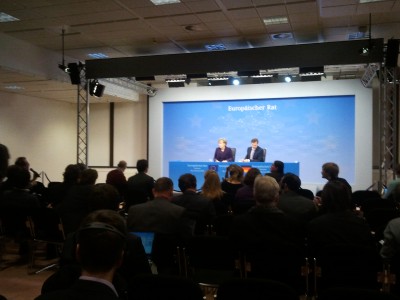
+ "We (EU) support the Political Reforms" and "we are determined to support the processes that occur there, and want to create a "New Partnership"" in such Mediterranean Countries, stressed also German Chancellor Angie Merkel, making a large mention to the on-going events and perspectives in the Mediterranean at her introductory remarks.
- "We (EU) asked to avoid further Violence and to respect the Egyptian People's Right, as well as of other Peoples' in that Region, to express their legitimate Democratic, Economic and Social Aspirations", she added, confirming the enlargement to an overall EU Policy in several Countries of that area.
- "EU made it unanimously clear, in the strongest terms, that we condemn Violence, and reaffirm all Citizens' Right to be able to make Free and Peaceful Demonstrations, under the Protection of Security Forces", while also "we found that any attempt to influence the Free Flow of Information , and in particular Journalists' work is unacceptable".
- "We (EU) have reiterated that we strongly support the Countries in that Region expecting that the Principles cited in our Association Agreements are respected in the Future even more than it had been done in the Past", the German Chancellor anounced, citting f.ex. the case of "Egypt, which has received in the last 3 Years some 500 Million €, as part of EU's Neighborhood Policy" : "These Agreements don't go without Values, but, on the contrary, have clear Expectations that we want to be implemented, perhaps more accurately than in the Past", Merkel underlined, inevitably making people think about eventually similar developments in the future also for Turkey, which receives from the EU some 1 Billion € each year...
- Merkel pointed out at EU "High Commissioner Catherine Ashton's forthcoming Travel to the Region, where ... she would arrange a "Package" of Measures to support Democratic aspirations on the preparations of Elections, etc", both in Tunisia and Egypt, etc.
+ Highlighting the unity of EU's "Foreign Policy as a whole" in that Area, Merkel concluded on that point by adding that "EU believes that, now, in such circumstances, the Middle East Peace process cannot be deferred, nor delayed, but that, on the contrary, they should work with great Intensity", as she said, pointing at the Timely "meeting of the (Middle East) Quartet, which will take place Tomorrow, at the sidelines of the Munich (International) Security Conference, which gets, now, a Special Significance".
- "In this context, naturally, we (EU) made it clear that any Future Government that may come in Egypt after Elections, to be held according to Democratic Principles, must respect the Peace Treaty that was concluded between Egypt and Israel, in connection with our (EU's) expectations on the situation in the Middle East", Merkel added, letting also suppose that EU would similarly expect from Egypt to continue to respect the Treaties signed according to the International Law of the Sea, in order to delimitate the Exclusive Economic Zones with Cyprus and Israel, for a Peaceful exploation of Oil/Gas resources at the Eastern Mediterranean...
Concerning Lady Ashton's forthcoming visit to Tunisia and Egypt, the German Chancellor confirmed that EU's High Representative "has our support", as "our Representative" of all EU's Heads of State/Government, "on the basis of the Principles on which we have agreed", particularly "in view of the Preparation of Elections" in these Countries, where the EU could "help with our know-how, shared expertise and, whenever appropriate, Material support".
But, she also agreed with French President Sarkozy (See supra) that this doesn't mean at all that EU Leaders, Heads of State/Government, wouldn't have to say no more any word on Egypt, Tunisia, etc., since "everyone will have to comment on that", because "we shall all contribute, of course, our Ideas about the New Partnership to be concluded with the (Mediterranean) Region", while "the situation is due to change, from one day to another, so that we'd all have to take anew positions", and to be "free to speak whenever we have something to say about the process" which is still going on, as she warned.
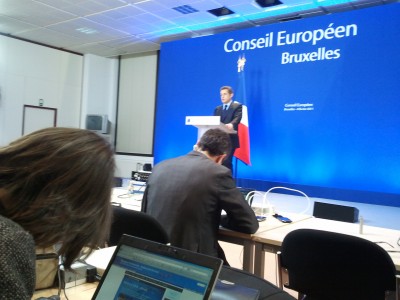
- "It's not a coincidence if the "Union for the Mediterranean" (See supra) is explicitly cited" in EU Summit's Official Declaration, observed later-on French President Sarkozy, who strongly contributed to its creation, on 2008. "In front of such as situation, the UFM is necessary, even if we might have to wait a little bit until the situation becomes more stable".
>>> - "We (EU) clearly condemned .. all violations of Human Rights, (and) of Press Freedom. .. I've been shocked by what happened vis a vis Journalists, independently of their Nationality, .. in Cairo. Threats against Medias are inadmissible", Sarkozy stressed from the outset. Moreover, "Egyptian People's aspirations for Democracy must be satisfied".
- But, "for the rest, I am not an Egyptian, and it's certainly not for me to say who should take over (the Government), when, and how", underlined the French President.
- "What counts is that the Democratic Transition is realized without Delay. The Egyptians themselves will will have to lead this movement, in full Sovereignity", Sarkozy pointed out.
- Because, "I'm not persuaded that we should, we, who are not Egyptians, interfere on the Timetable, on the Modalities or on the Personalities which might lead this process" : "We clearly condemn violence (and) what happened, but we leave it up to the Egyptians themselves to decide who must lead it, and how", he explained.
+ Moreover, "we (EU) can't refuse a Democratic process only because there is a Risk for it to deviate towards (Islamic) integrism", and/or "a risk to contaminate" the whole area, he replied to earlier questions.
- "I've seen, as you also have, a number of Statements about Foreigners' interventions", etc. That's why I think that, if someone sincerely supports Egyptian People's Democratic Aspirations, as well as Tunisian People's, etc., then, he must clearly Stic on Principles, strongly proclaimed and defended, but resist to the temptation to interfere, which would, then, turn against all those who hope for an authentic Egyptian democracy. Because you know the History of these Countries, and the Sensitivity of these issues".
=> "So that, more we (EU) Strongly insist on Principles, more, I think, we should Resist to the temptation ... to put Names on the top, so that this or that Political Personality in these Countries would appear as being supported by Foreigners. As you know, this happened many times in the Past, and didn't always give a good solution", he warned.
--------------
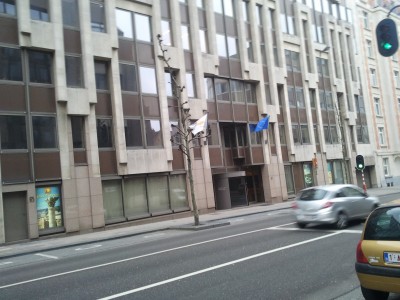
This obviously delicate point was also made in Brussels by the President of the EU Member Country which is located closer to Egypt : Cyprus' President Demetris Christofias, in a parallel Press Statement, where he expressed his "Concern" for the recent events, "as well as the need for a Normal transformation of the situation, in a way which respects the Democratic Rights of all Citizens, who must decide themselves for the Future of their Country, without Foreign Interferences", warning to be "Careful" because of possible consequences to the Middle East issue "and to the wider Region", (as noted the Head of the Neihbouring EU Country which has notoriously concluded official agreements with Egypt on the Economic Exploitation of possible Oil/Gas findings in S/Eastern Mediterranean).
---------------------------
- F.ex., "Violence and Intimidations against Journalists" must "stop" : This will show if it was a "bad but spontaneous movement", (which will stop once the Egyptian Authorities wish to put an end to that), or, on the contrary, an "organized" one. Otherwise, i.e. if it persists, "we (EU) cannot accept it", Sarkozy concluded.
- Already, "what happened is unacceptable. And if it would continue, this would have Serious Consequences in the Relations that we might have with a Country, whatever, which would allow such behaviors against Journalists, of whatever Nationality they might be", the French President warned.
+ Concerning EU's High Representative, Cathy Ashton's forthcoming Visit to Egypt and Tunisia "during the next 15 days", as a collegue asked, Sarkozy made it clear that "Mrs Ashton speaks as our representative, on our (EU's Heads of State/Government's) behalf, taken collectively", so that "each one of us", individually and/or bilaterally, etc., "can contribute with his modest added-value whenever needed". Particularly when, "there are some EU Member Countries which know better certain Arab Countries than others", as he observed.
Sarkozy's strance (as always in agreement with German Chancellor Merkel : See supra) and, in particular, his latest hint, fitted well with Greek Prime Minister George Papandreou's anouncement, later this evening in Brussels, that he intended to take an Initiative to visit Egypt, after having spoken to bothe EU and USA, Russia, a.o. political representatives, including accross various Egyptian parties :
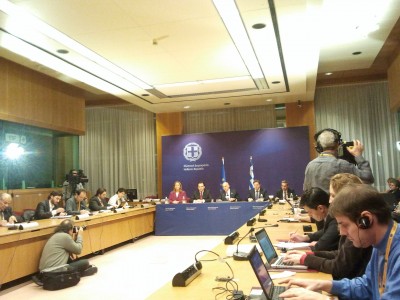
- "Egypt has a special interest for us, as Neighbouring Countries, affecting more directly our Economy and Security, including, f.ex. in case of an eventual explosion of Refugees towards Greece, but also because of the Historic existence of (culturally) Greek Communities in Egypt, of Alexandria's (Christian Greekl Orthodox) Patriarchate (competent for all the African Continent)", Papandreou reminded, revealing that he had already spoken about his Initiative not only with "Mubarak","El Baradei", and "Mussa" (SG of the Arabic Union), but also "with several EU Leaders", as well as with USA's "Clinton", Russia's "Lavrov", etc.
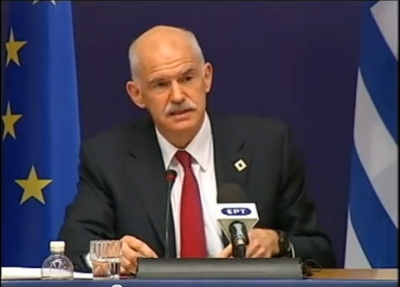
+ "Moreover, if recent reports about important Oil/Gas findings at the Eastern Mediterranean, as f.ex. in Israel, Cyprus, etc., prove to be true, then, precisely, it could have a Strategic Importance for Peace and Security in that larger area to link the Eastern Mediterranean with the European Energy Network", the Prime Minister of Greece concluded at his Press Conference after the EU Summit,
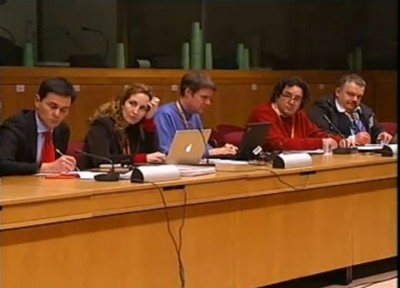
looking straight towards "EuroFora", sitting close to "Bloomberg News" (both with blue colors), among other Journalists from Greek Media (with red colors), at his left side, (right from the door)...
(NDLR : Public Version partly Updated compared to the initial DraftNews sent earlier to "EuroFora"s Subscribers/Donors )
***
French President Sarkozy to EuroFora: Research/Innovation part of €uroZone+ Competitivity Summit ?!
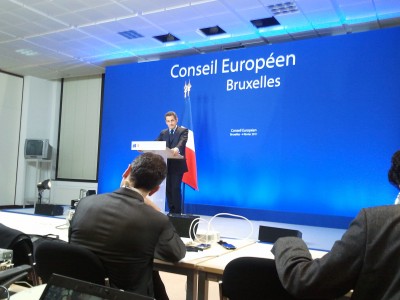
*Brussels/Angelo Marcopolo/- Concrete ways to boost Scientific and Technologic Research in €uroZone's Member States can be a key Factor of a brand new Competitivity Pact due to be adopted by an exceptional €uroZone's Convergence Summit on March 2011, proposed earlier today by the Franco-German Leaders and accepted by EU's Energy and Innovation Summit, as it results from a reply to an "EuroFora"s Question by French President Sarkozy, speaking together with his Economic and Political Counsellors to Journalists in Brussels, including "EuroFora", at the conclusion of the 1st EU Heads of State/Government's gathering this year.
Developing now further the Strategic moves towards stronger Integration and Convergence at EU's core, initiated earlier at Freiburg's Franco-German Summit and welcomed by EU's Brussels Summit on December 2010 (See "EuroFora"s NewsReports from both events, on the spot), French President Sarkozy and German Chancellor Merkel anounced together at Noon their joint decision to propose to all interested EU Heads of State/Government to coordinate a series of concrete Structural Measures in their Economic Policies in order to achieve the goals of a "Competitivity Pact" due to be decided at a special €uroZone+ Summit early March.
----------
Well informed Diplomatic sources, speaking to Journalists including "EuroFora" earlier in Brussels, stressed that this was "a very Important new move", both because it organized, for the 1st time, a Forward-looking €uroZone Heads of State/Government Summit, which was due to open New, Strategic Perspectives for the Future, instead of dealing just with Urgent matters, as it had succesfully been done in order to start giving a reply at the beginning of the Financial Crisis with the October 2008 €uroZone Summit, during the French EU Presidency, at Elysee Palace in Paris (See "EuroFora"s NewsReport from the spot), as well as because the new move implied a Political Will to take a series of "Structural" Measures to deeply transform €uroZone into a much more Competitive area in the World.
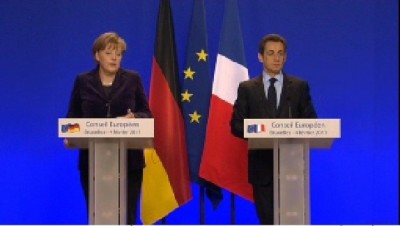
- "Germany and France want to make it clear that we defend the €uro not only as a Currency, but also as a Political Project", which means not only the Solidarity that we introduced in 2010, (f.ex. with the European Financial Stabilisation Fund and the Permanent Mechanism" : See "EuroFora"s relevant 12/2010 NewsReports), but also, and above all, that €uroZone Countries ...are also Growing together", thanks to "a Closer Economic Cooperation, able to ensure our People's Prosperity" by "increasing our Collective Competitivity", stressed Merkel from the outset.
- In order to make it Politically clear that we want to Grow closer together, we should be guided by the Best examples, taken as standards, inside a Competitivity Pact, which must show, in one Year, that we are serious, not about speaches, but about effective action in order to make Europe a more Competitive Continent, the German Chancellor concluded.
- "We want .. to advance at a New Stage, bringing a Structural reply", by "a Stronger Integration of Economic Policy serving the Goal to reinforce our economies' Competitivity", added Sarkozy.
- This expresses "an extremely strong Political Will of (EU's) Franco-German axis, for a structural European Ambition, able to respond to the challenges faced by all our economies, so that all Global observers can realize that the European Economies are really heading towards a Competitivity-driven convergence", stressed the French President.
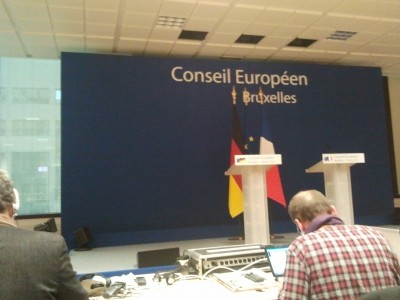
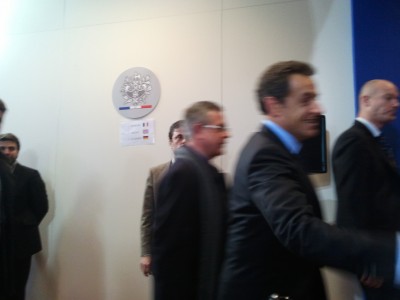
- "Scientific Research, Mr. President, could-it become part of the [ €uroZone's] Competitivity pact ?", "EuroFora" questioned Sarkozy afterwards.
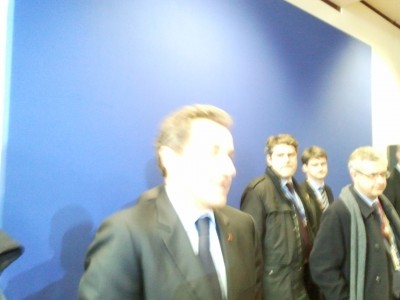
Recent moves towards Universities' "Autonomy" in France and elsewhere, (which started initially with the reUnification of Strasbourg's University since 2009/2010), in theory aim to make Economies on Adminsitrative and Bureaucratic red tape, while also boosting Investment to Scientific Research and Technologic Innovation, often working closer together with big Industry and innovative SME's, so that it all contributes to augment a Society's economic Competitivity, as "EuroFora" understands it from various relevant sources, (Comp. earlier NewsReports).
"Research" is, moreover, included among various other "Compeitiiy" factors, also by French Businessmen's (MEDEF's) Chairwoman Parisot, acccording to oher sources.
- But, "even if we have worked a lot with Chancellor Merkel on these issues, (and) we have some Ideas, nevertheless, in order to unite together the largest number of (EU Member) States around these ideas, we prefered not to put a paper on the (negotiation) table, but to ... invite (EU Council) President Van Rompoy, on the basis of the ideas that we communicated to him, to gather the wider possible consensus, so that we'll decide on March", Sarkozy anounced earlier carefully, reserving final decisions on concrete matters for later-on.
+ Because "our idea, with Mrs Merkel, isn't to impose to everybody the same thing : F.ex. on Pensions, the point isn't to impose to all the same Year of Age, but rather to agree on a link between the years needed and the life-span, which variess from country to country.Or, f.ex., for the Tax on Profits, without denying differences, we could agree on a fiscal basis, etc., he observed. "Convergence doesn't mean total Identity, but leaning towards rapproachments, instead of widening gaps. And we hadn't to decide Today on Details, but to mark a political Will for a Pact, an Economic Governance, a Convergence". There is no rigidity: After negotiations (led by Van Rompoy with Baroso's support) we shall see where we'll arrive. I already said, through my aides, that we don't agree on all ideas, but that's not a catastrophe", since "we agree on Principles : For an Economic Governance, a Convergence and more Integration of Economic Policies", as well as "€urozone (Top) Meetings for €uro's issues, and Open €uroZone Meetings for the Competitivity pact", he explained.
----------------
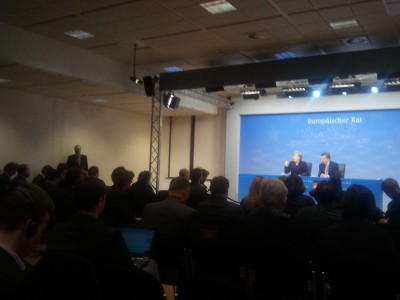
+ Just a few minutes later, German Chancellor Angie Merkel, concluding her own Press Conference at an adjacent Room, also hinted that Scientific and Technologic "Research policy" should indeed, be part of €uroZone's forthcoming, 2011 "Competitivity" Pact :
- "This involves not only Financial issues, but can also include Social affairs, Research Policy, etc", for which National Governments are legally competent, and, therefore, should closely coordinate their actions inside €uroZone, Merkel stressed, apparently agreeing with Sarkozy's view on this key point raised by "EuroFora"s question.
Moreover, even Germany might have some interesting lessons to learn f.ex. from Sweden on Innovation policy, where it seems to be doing better, while €urozone Governments could usefully coordinate their parallel actions on some key points concerning Education, f.ex., even if most of it may remain in their national competences, Merkel added in this regard.
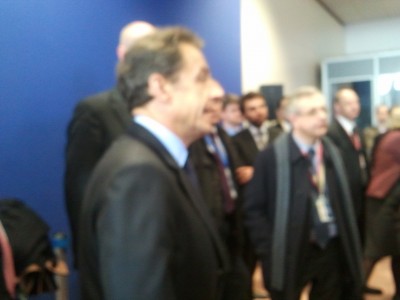
+ Sarkozy, speaking further to Journalists in Brussels, including "EuroFora", after his concluding Press Conference at the end of the February 4, Energy and Innovation EU Summit, stressed the "Importance (of) what was decided" :
F.ex., in order to broker an Agreement, we had to "explain to those (Non-€uroZone Countries) which are afraid to be excluded, that Structural problems can be dealt also in a 17-plus format, where they can join-in if they wish.
While also convince "those who are more Sovereignists, afraid that they might not keep the possibility to decide on some issues that they raised, (f.ex. Salaries' indexation, Age for Pensions, etc)", by telling them that all concrete points will be open to discussions, and that Formulas can be found to alleviate particular fears, while also clearly keeping the general, overall trend towards enhancing competitivity.
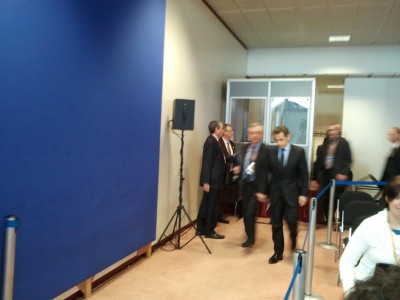
=> - "Convergence is a Direction, it's not a starting point !", Sarkozy stressed, adding that it was "normal to have discussions" on particular issues, once "we agree on Principles".
-------------------------------
- "It's normal for the issue of €uroZone's Economic Governance to be decided by €uroZone Countries, since its their Ministers of Finance who are due to follow this up, eventual Sanctions are to be applied on €uroZone Member States", etc.
- So that, when we speak strictly about €uroZone's specific Economic Governance, that's for €uroGroup's early March Summit to decide.
But when it comes to Competitivity stricto sensu, then, it's also other Non- €uro EU Member Countries which are welcome to participate, if they wish, f.ex. in a 17+ format, considering also that some among the remaining 10 EU Countries wish to join the €uro in future. But even for the UK, which opted out, nevertheless, already back on 2008, at the 1st ever €uroGroup Summit, focused on the urgent need to struggle against the Global Financial Crisis, the British Prime Minister (then G.Brown) was present during the greatest part of Heads of State/Government discussions, and left only at a later point, Sarkozy reminded.
* It's presicely at this Strategic Juncture, that the issue of Scientific Research and Technologic Innovation, raised by "EuroFora"s Question to the French President (See supra), might probably facilitate also a useful cooperation between €uroZone Countries and the U.K. as well as other Non-€uro EU Members, considering particularly UK's past insistance on Science and Innovation during the latest, 2005 negotiations on EU's Multi-Annual Financial Perspectives, (Comp. relevant publications by "EuroFora"s coFounder then).
Considering also the well known importance that both the former EU "Lisbon Strategy" and the current "2020 Agenda" gave to the development of Scientific Research and Technologic Innovation, this might explain even more the reasons for which EU Commission's President, Jose Barroso, reportedly supports the idea to organize a "Competitivity" €uroZone Summit on March :
- Barroso clearly stated his agreement, later-on, during EU Summit's concluding Press Conference, together with EU Council's President Van Rompoy, by observing also that the whole idea is that, while EU Commission will keep its already existing competences, in addition, more Economic Cooperation will extend between €uroZone Countries, in order to coordinate their action in areas which are now in National Competences, so that Europe will increase, in fact, its capacity to act", as he said.
- German Chancellor Merkel, speaking earlier at her final Press Conference, made it, indeed, clear that many among the "Competitivity" issues are and will remain in the Competence of National Governments, without any transfert to the EU, but with the important difference that now, €urozone Countries want to closely Coordinate their actions, through a systematic InterGovernemental Cooperation, able to provide a "New Quality" in Europe's overall efficiency.
--------------------------
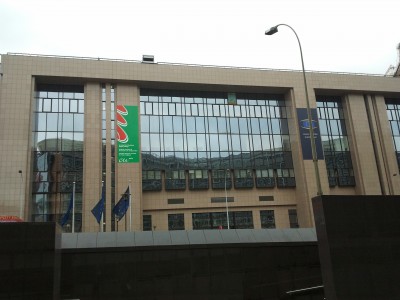
+ A strong backing was also given, in Crystal-clear Pedagogical terms, by EU Council's President Van Rompoy, in his concluding Press Conference :
- "€uro is a Strong Currency, particularly when there are no major divergences inside its area", he stressed in reply to questions, highlighting an issue which had been outlned already at ECB's 10th Anniersary, July 2008 in Frankfurt, (comp. "EuroFora" co-founder's PressReports from that event). - "It's only weak when we might have major divergences, and that's why it's very logical that we work Closely Together, because we have this Common Currency, to decrease divergences by coordinating more our policies, he explained.
Therefore, the 2/2011 EU Summit reached "a Broad Agreement" for "deeper Convergence" to enhance "Competitivity", Van Rompoy stressed from the outset. Even if we didn't discuss yet in depth on concrete proposals, which will be prepared for March, nevertheless, there was a large support of all 27 EU Member Countries on the principle of the need to strengthen Competitivity, by giving a New Quality in Coordination and a Higher degree of Convergence, he noted.
In the €uroZone, it was clearly decided to strengthen Economic Cooperation, since, naturally, when you have a Common Currency, you need also Closer Economic Coodination, because a currency is strong only when its Economic Fondamentals are strong, Van Rompoy added (comp. supra).
(NDLR : Public Version partly Updated compared to the initial DraftNews sent earlier to "EuroFora"s Subscribers/Donors)
***
EU Commission move on Raw Materials fits French 2011 G8/G20 chair goal + shows CFSP need
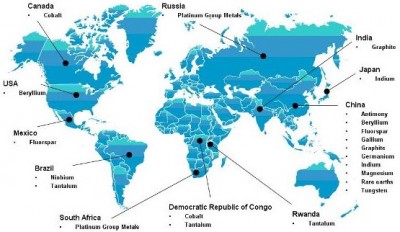
While France welcomed EU Commission's decision to prepare measures for strategic Raw Materials threatened by prices' instability worldwide, recent events at EU's neighborhood clearly indicated, at the eve of an important EU Summit on Energy and Innovation here in Brussels tomorrow, Friday, that the matter obviously is not only economic, but also political, and probably with strong foreign and security/defence policy aspects..
French Ministers of Economy, Industry, Agriculture and EU affairs, Lagarde, Besson, Le Maire and Wauquiez, respectively, in messages sent to the Press, including "EuroFora", hailed today EU Commission's latest move to start facing the challenge of raw materials' unstable prices, and called the EU to launch a wide and ambitious policy at a domain which is notoriously a key point in President Sarkozy's 2011 G8-G20 Priorities.
EU Commission's President Barroso focused this time on High-Tech Materials indispensable for any developed Industry, but similar issues of prices' abnormal instabilitry are notoriousy denounced recently also on Agricultural raw materias, which affect Food Production, as well as on Energy, etc.
In all such cases, the point is to find how to "secure supply of raw materials for the European industry for coming years, .. (and) ensure that supply of commodities and raw materials matches demand in a resource-efficient way, contributing to sustainable growth in the European Union", as Barroso added on this occasion.
But, in addition to socio-political turmoils, often triggered by basic Food products suddenly made expensive, and to Speculation on Industrial Raw Materials, or Oil/Gaz unstabe prices, etc., the recent events around the Eastern Mediteranea, in Lebanon, Tunisia, Egypt, etc, provoking suddeny sky-rocketing market prices for Oil etc., obviously reveal that the heart of the matter in such cases, (helas, more and more frequent) is not Economy, but Politics, and even Foreign and/or Security/Defence issues !... In front f.ex. of a Pro-Western Lebanese Prime Minister with links to Europe, who .. implodes suddeny when people start speaking openly about huge Gas deposits accross the Lebanese Mediterranean Coasts shared with Israel ; or a Stable Tunisian regime for Decades, which suddenly cracks down shortly after rumours about Strategic Pipeline links etc. become noisy ; and a more than half of a Century stable Egyptian regime, all out of a sudden shaken up by big social unrest provoked by unknown groups, and foreign interventions asking the immediate resignation of the Country's President, (as f.ex. Turkey and the USA did, contrary to main EU Countries, which advised an orderly Democratic Change), just after growing Political Controversies on the vast and extending Oil/Gas fields' Discoveries at Nile river's Mediterranean Delta, added to growing nervousness, particularly of some Foreign circles (Comp. supra), against Egypt's serious, stable and responsible policy on friendy agreements to delimitate the various neighbouring Countries' Economic Zones over South-Eastern Mediterranean's Seabed, reportedly full of Oil/Gas deposits, as huge as that of Mexico's Gulf (See relevant earlier "EuroFora"s NewsReports), naturally, it's not only a better Economic policy that Europe needs, but much more an active and efficient Foreign and Security/Defence policy.
Interesting "cocktail" of Economico-Political matters linked to Global stakes, at tomorrow's Heads of State/Government EU Summit's working Lunch table for discussion, among interrelated Energy, Economy and Science-Technologic Innovation issues... An unexpectedly heavy and dense Agenda, just for less than 1 Day, even more than the December 2009 and 2010 official European Councils, which had been exceptionely emptied from most of their initially scheduled Poitical a.o. issues. Now, it's the opposite which apparently emerges..
PACE Legal Commitee Chair Purgurides +Secretary General Sawicki to EuroFora: Human Rights at the Top
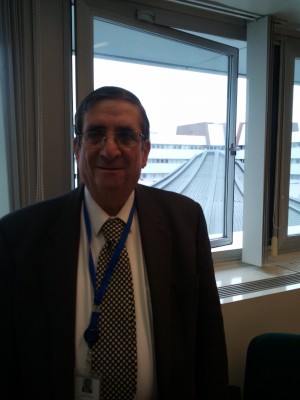
Both CoE Parliamentary Assembly (PACE)'s new Secretary General, Sawicki from Poland, and the President of its Legal/Human Rights Committee, Pourgourides from Cyprus, speaking to "EuroFora", expressed their convergent wish to put Democracy and Human Rights "at the Top" of Heads of State/Government's Political Summits' Agenda.
- "By a coindidence, the same Day (Jan. 26) that UNO's Secretary General Ban Ki Moon was in Geneva for Cyprus' intercommunal Talks and other issues (See "EuroFora"s NewsReports from the spot), here, in Strasbourg, CoE's Assembly debated and voted on more than 3 Reports of Exceptional Importance on particularly serious Human Rights issues, in a kind of "overConcentration" never seen for many years : Your own, PluriAnnual Report on the execution of ECHR's judgements, another on Freedom of Press, as well as that of your friend (Swiss Liberal MEP) Dick Marty, on "Missing" Persons apparently submitted to atrocious Crimes against Humanity in Kosovo, Albania, etc., in addition to a supplementary (almost "concluding") Report on protection of Witnesses and Independent Investigations in cases of extremely Grave Violations of Human Rights, etc", while ECHR today (Jan. 27) also held its Annual Press Conference, "EuroFora" observed.
- "What is your main Message, as President of the (CoE Parliamentary Assembly's) Legal and Human Rights Committee, with all these Reports, taken all together, practically at the same moment, on so grave violations ?", "EuroFora" asked the mainstream MEP Christos Pourgourides.
- "My Message is that we must try to make the Parliamentary Assembly of the CoE a much more Relevant organization. We must try to make the Assembly a body which, when it talks, everybody takes notice of it !", the experienced President of its Legal/Human Rights Committee ambitiously stressed from the outset, in reply to "EuroFora"s question.
- "We (PACE) have shown that we can do a good work on very important matters, and we have shown that, in the (CoE's) Assembly, we have the ability to defend Human Rights in a most Effective way", he went on to claim, optimistically.
- However, "despite our (PACE's) susbtantial and very important work", nevertheless, "many things (still) remain to be done", the experienced mainsream MEP from Cyprus acknowledged.
- "But, if we continue our work with flair and with Devotion, I'm sure that, in a few years' time, the CoE would be Highly Respected by all Citizens for its efforts to i Human Rights", Pourgourides highlighted.
+ - "Practically" speaking, "EuroFora" observed that, in his Report, (meanwhile adopted by CoE Assembly's Plenary), the President of PACE's Legal/Human Rights Committee had suggested also a possibility to use the threat to suspend the rights to Vote and/or Speak concerning those MEPs whose Country persists to seriously violate Human Rights : - "That's a kind of Sanction that you (PACE) can decide yourself", (i.e. without waiting for CoE's Committee of Ministers) :
- "It's (indeed) a Sanction that we must ressort to, in case of Failure by Parliamentarians to do their job in an effective way, i.e. to push their Governments to implement ECHR's judgements in a Speedy manner", Purgurides agreed.
+ "It's not an idle threat, it's a Real Threat, to which we (PACE) will ressort if the problems are not met", Therefore, "we (PACE) hope that all Countries will start executing ECHR's Judgemets speedily, so that we don't resort to this measure", he warned.
------------------------
Pourgourides move appeared to be well in line also with general expressed by the recently elected, new Secretary General of the PACE, the experienced Wojciech Sawicki from Poland :
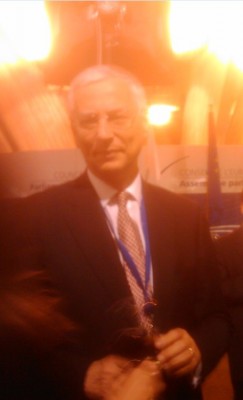
Speaking earlier at another occasion to "EuroFora", this key personality (already since the latest Heads of State/Government PanEuropean CoE's Summit on 2005 in Warsaw, which fixed CoE's activities' focus on Human Rights, Democracy and Rule of Law, since then), went well beyond an old-fashioned contradiction between "Political" issues supposed to be the only ones which really interest CoE Member Countries' Heads of State and Government, and Human Rights, etc., traditionally supposed to be respectable, but rather at a simply "Ministerial" or "Legal Experts/Judges" level only...
- "What would you say (as a European EU/CoE Journalist) if we (CoE) succeeded to attract Heads of State/Government's attention up to Summits with some core Human Rights/Democracy topical issues ?", a smiling Sawicki suggested to "EuroFora", presenting that Horizon as his main Strategy for the next 5 years...
- Invited by "EuroFora" to react to Sawicki's ambition, Pourgourides replied, enlarging the scope wider, that "it's our (PACE's) duty to motivate ...not only Governments, but also all other Organs which deal with Human Rights, in order to put Human Rights there where they should be : At the very Top of their Agenda !", he concluded.
-
ECHR President Costa to EuroFora on Cyprus Refugees: Rights may be reinforced if there is No Progres
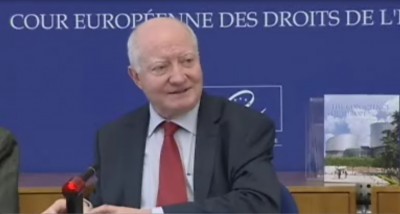
Replying to "EuroFora"s questions at the Annual 2011 Press Conference of the PanEuropean Court of Human Rights, one Day after UNO's Secretary General Ban Ki Moon spoke on Cyprus' issue at Geneva (see "EuroFora"s NewsReport from the spot), EuroCourt's President, Professor Jean-Paul Costa, agreed, in substance, that its case law on Refugees/Displaced Persons' Human Rights in Turkish Occupied Cyprus might have to change, in order to be rectified and become anew as strong as it was initially, if there is no real progress for a Political Solution of the overall Cyprus' issue, particularly because of Turkish side's attempts to exploit a recent softening of some ECHR's rulings, which raise issues of "Coherence" with its traditionally protective case-law, at the same time that EU's Court of Justice at nearby Luxembourg starts growing in importance after Lisbon Treaty's entry into force, together with EU's Charter of Fundamental Rights, which overlaps also in this area, risking eventually to result in a 2-speeds Human Rights' level of protection, otherwise.
ECHR's President reacted particularly to UNO SG's statements at nearby Geneva, evoked by "EuroFora", and expressed the hope that his optimistic appreciation about a "Progress" in the ongoing Peace Talks for Cyprus' ReUnification will produce real effects, or else, ECHR might have to act :- "So, I hope that what BKMoon said yesterday in Geneva shows the right way .. I can't say more, Today" on that delicate issue, Costa stressed in conclusion, obviously reserving a possibility to react according to developments in the Future. In particular, "if the club is curbed at the extreme opposite, i.e., if the Turkish side denies so much G/C Refugees/Displaced persons' Human Rights, that this might become an Ostacle to Peace", as "EuroFora" asked Costa, then, "we (ECHR) might Change our (recent) case-law" , ECHR's President warned.
Costa admitted, in substance, that ECHR had softened its traditional case-law on Refugees/Displaced persons in Cyprus practically hoping to facilitate a Political Solution of the overall Cyprus' issue, but did not deny "EuroFora"s warning that, if Turkey persists into excessively exploiting that by making intransigeant claims seriously and disproportionaly detrimental against Cyprus' Refugees/Displaced persons, provoking another obstacle to a political solution of the overall Cyprus' issue, then, ECHR would have to reconsider its recent controversial rulings and perhaps restore, in one way or another, the strong legal protection that IDPs of Cyprus had in ECHR's landmark traditional case-law, which had inspired also UNO's famous "Pinheiro Principles", according to an Official UNO Booklet destinated to all Refugees/IDPs around the world.
-------------------
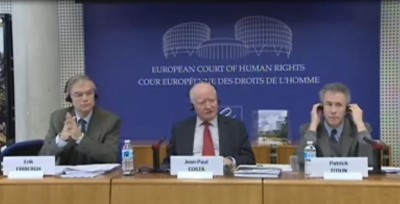
- "Yesterday UNO SG Ban Ki Moon in Geneva, after opening World's Human Rights Council, dealt with Cyprus' issue, where, independently of its Political aspects, one of the thorny points is that of Refugees/Displaced Persons' Human Rights", "EuroFora" observed from the outset in our 1st Question.
,
- "The Turkish side apparently considers ... that most of ECHR's traditionnal case-law on Refugees/Displaced persons, dating since 1994-1996, has been very much Pushed aside, despite landmark decisions of ECHR's Full Plenary taken by more than 20 or 30 EuroJudges" from all over Europe then, just "by a few recent, controversial rulings of only 6 or 7 EuroJudges. So that now, almost everything would have been pushed aside, in order to deal with it purely Politically, without even speaking about Human Rights", unless, perhaps, as simply .. "Technical" matters to be dealt with by "Experts", according to some expressions used yesterady in Geneva under Turkey's obvious pressure, which may be dangerous also on other cases"
- "Do you think that, as a matter of general principle, in these as well as in other cases, ECHR's Grand Chamber, (since ECHR's Historic "Plenary" doesn't exist no more), is Free ...to eventually reconfirm a crystal-clear support for Refugees/Displaced persons' Human Rights, as ECHR's traditional case-law initially did, or are you now (ECHR) Blocked, and hindered to Rectify ?", "EuroFora" asked.
- Such a move might go "particularly if ECHR observes that one of those recent controversial rulings might become an "Obstacle to Peace, (because if such opposals to ECHR's traditional case-law were lifted, Peace Agreements would be Easier, at least for Greek Cypriots)", we noted in this regard.
----------------------------------
+ Meanwhile, "at the same moment, (i.e. while Turkey tries to exploit on Cyprus some recent Deviations from ECHR's traditionally strong stance for Refugees/Displaced persons : See supra), EU's Lisbon Treaty" recently entered into force (12/2009) together with EU's Charter of Fundamental Rights. Thus, a Risk for a "2 Speeds" case-law on Human Rights might emerge, particularly if ECHR lowers its standards, while, on the contrary, EU's Court of Justice in Luxembourg, inspired both by ECHR's traditionally Higher standards, and EU's Charter on Fundamental Rights, may develop a Higher-level protection for EU Citizens' Rights, "EuroFora" warned.
-----------------------------
"EuroFora" also asked Costa to excuse us for the exceptional circumstances in which this question was raised, because of unprecedented harassments when we were trying to return urgently from Geneva to Strasbourg to be present at ECHR President Jean-Paul Costa's Annual 2011 Press &éConference, early next Morning in Strasbourg, after UN SG Ban Ki Moon's High Level meeting on Cyprus, (See Draft NewsReports from Geneva, already sent to "EuroFora"'s Subscribers/Donors), depriving us even from the elementary time for elementary sleep overnight, (threatening to hinder us to participate at ECHR's Annual 2011 Press Conference or, at least, undermining our participation by the provoked ill-treatments we suffered overnight)..
-----------------------------
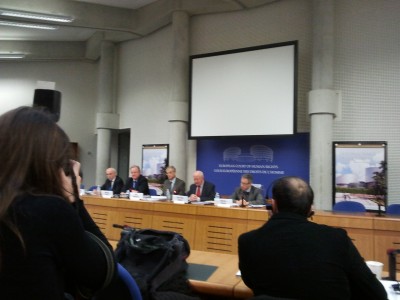
- "Cyprus' issue is extremely complicated, as You know, (and) the (enforced) separation of the island persists now since more than 36 Years (i.e. since the 1974 Turkish Military Invasion and on-going Occupation), and there are many Pending Applications at the ECHR, against Turkey, but also against Cyprus' Republic", Costa started to reply.
- "I wouldn't like to enter into details on these affairs, because they are still Pending, and we don't know yet how these cases will conclude", ECHR's President carefully replied to "EuroFora"'s 1st Question, otbviously keeping the Future open to eventually differend, new developments...
- At any case, indeed, "we are trying, inside ECHR to maintain the Coherence of our Case-Law", he acknowledged, in reply to "EuroFora"s observation on a few recent, controversial decisions of some simple 7-member Chambers, which gave the impression to lower ECHR's traditionally High Standards on Refugees/Displaced persons' Human Rights, (See supra). s- This is a must "particularly as far as it may also concern all the other 47 CoE Member Countries", Costa admitted, apparently agreing with "EuroFora"s critical observation (See supra) that if ECHR gave any impression to lower its standards on Refugees/Displaced persons' Human Rights, this might be "Dangerous also for other cases", throughout all Europe and beyond.
- "But the beginning of Your Question makes me think at what I've already said, i.e. that Political Conflicts can be solved in an Easier and more Efficient way, by Political instead of Judicial means, f.ex. by applications to the ECHR" ... "And I've also heard from the various parties involved in the Cyprus' issue, several times, the estimation that it's not ECHR which might ever settle the situation existing at the island, nor even the situation of Human Rights' Violations committed at the island (of Cyprus), but a(n initially) bilateral and (afterwards endorsed by a) multilateral agreement" (at an International Conference).
- However, even today, on 2011, ECHR still has to deal with "many cases of Human Rights Violations which are the direct result of Conflicts" as "in Turkey and Russia", even there where "the situations have ameliorated meanwhile", as well as with "2 InterState applications on conflicts between Russia and Georgia, where it's clear that the 2008 conflict provoked Human Rights violations, probably from both sides, even if we'll be fixed on that when a decision will be taken", asap., Costa observed earlier.
------------------------------
>>> Therefore, the main thrust of ECHR President's reply to "EuroFora"s question focused on another, more concrete and topical point, of great interest during the forthcoming Weeks/Months :
- Specifically on Cyprus, "I read yesterday in the Press the statements made by (UNO's SG) Mr. Ban Ki Moon", (See "EuroFora's DraftNews, already sent earlier to Subscribers/Donors), Costa went on to add.
- "He (UNO's Secretary General) is usually a Cautious man, but there he appeared Optimist, concerning the "Progress" made by the on-going (intercommunal) Talks in Geneva", ECHR's President observed.
- "So, I Hope that what (UNO's SG) Mr. Ban Ki Moon said Yesterday in Geneva, shows the Right Way, and I can't say more, Today", Costa stressed in conclusion, for the Moment, obviously keeping his cards Open for the Future, by (indirectly but surely) indicating that EuroCourt's stance would change if it found, f.ex., that the Turkish side might obstruct a solution for Cyprus' reUnification, eventually by exploiting ECHR's current restrain on Greek Cypriot Refugees/Displaced persons' Human Rights, as "EuroFora" denounced (See supra).
- "If the club is curbed at the extreme opposite, i.e., if the Turkish side denies so much G/C Refugees/Displaced persons' Human Rights, that this might become an obstacle to Peace, can't you (ECHR) do something ?", "EuroFora" asked anew President Costa, Sspeaking off micro, after the end of ECHR's Press Conference,
- "We shall see. If that's the case, we might Change our case-law" (revirement), ECHR's President made it clear in reply to "EuroFora"s explanatory question.
-------------------------------------
- "Concerning another part of your question, (See supra : on risks for a "2 Speeds" Human Rights case laws, if ECHR lowers its traditional standards, while ECJ develops stronger case-law with a "Higher" protection of EU Citizens' Rights after EU's Lisbon Treaty and Fundamental Rights' Charter's entry into force : See supra), "I don't think that there is a risk of Diverging Interpretations between that of EU's Charter on Fundamental Rights and the PanEuropean Convention of Human Rights, but, precisely, one among the aims of EU's accession to the PanEuropean Convention on Human Rights, is to try to Harmonize up to the maximum, the interpretatuin of these 2 Documents, because, as I've just said, they overlap many times, almost at 90%", Costa told "EuroFora" earlier.
- "Now, on the question you raised, concerning particularly Cyprus' (Refugees/Displaced Persons' Human Rights) case, I don't see, for the moment, (for the Time being), a Risk of Diverging Interpretations. But we shall really see (what might happen) in the Future", ECHR's President concluded cautiously, i.e., without excluding anything in the forthcoming years...
--------------------------
- Meanwhile, indeed, "National Courts found it sometimes Difficult to follow ECHR' case-law's Changes", and that's why we organized now, in 2011, a Seminar dedicated to EuroCourt's "Evolutive Interpretation", another Key ECHR's Official told "EuroFora" in addition, after "EuroFora"s criticism also the recent controversial "softening" of ECHR's case law, with less protection than before for Refugees/Displaced persons in Occupied Cyprus, etc., contrary to EuroCourt's traditionally "strong" initial case-law. (See supra).
- Romania President Basescu to EuroFora: AGRI + Danube Energy Transport Projects in Good Progress
- UNO Secretary General, Ban Ki Moon sponsored Trilateral Cyprus' Talks : Geneva Progress Mystery ?
- UN SG Ban Ki Moon: Pakistan blockade on Fissile Material => Nuclear Proliferation risk (Iran,Turkey+
- CoE Rapporteur on Missing People organs Kosovo traffic, Marty to EF: Check also Cyprus, Argentina+
Main Menu
Home Press Deontology/Ethics 2009 Innovation Year EU endorses EuroFora's idea Multi-Lingual FORUM Subscribers/Donors FAQs Advanced search EuroFora supports Seabird newsitems In Brief European Headquarters' MAPs CoE Journalists Protection PlatformBRIEF NEWS
- 00:00 - 02.06.2021
- 00:00 - 18.10.2020
- 00:00 - 19.06.2020
- 00:00 - 18.05.2020
- 00:00 - 20.04.2020
- 00:00 - 02.02.2020
- 00:00 - 09.12.2019
- 00:00 - 27.11.2019
- 00:00 - 16.11.2019
Popular
- Yes, we could have prevented Ferguson riots says World Democracy Forum's Young American NGO to ERFRA
- Spanish People Elect CenterRIGHT Majority with 1st Party and Total of 178 MPs (6 More than the Left)
- Pflimlin's vision
- The European Athletic "Dream Team", after Barcelona 2010 Sport Championship Results
- Source Conseil d'Europe à ERFRA: Debatre Liberté d'Opposants à Loi livrant Mariage+Enfants à Homos ?
- Head of BioEthics InterGroup, MEP Peter Liese : "Embryonic stem cell research reaching its END" !?
- Spain: Jailed Turkish Terror suspect with Explosive,Drones,Chechen accomplices stirs Merah+ Burgas ?
- UN Head Ban Ki Moon at CoE World Democracy Forum : - "Listen to the People !"
Latest News
- Test Photos (f.ex.+ Invit to EU + Korea Peace meeting)
- EUOmbudsmen Conference 2022: Digital Gaps affect People's Trust threaten EF Project on EU Future ?
- French Election : Black Out on Virus, but Obligation for Fake 'Vaccines" Challenged
- Both French Presidential Candidates point at "Humanism" in crucial times...
- France : Zemmour = Outsider may become Game Changer in Presidential + Parliamentary Elections 2022
Statistics
Visitors: 62403415Archive
Login Form
Other Menu
Brixen-Bressnone/ACM/10 August 2008
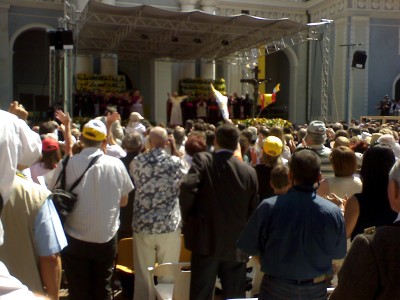
Pope Benedict XVI launched a call "in the name of the common Christian heritage" of "all Christians", to "immediately stop military actions", and "resolutely take, the road of negotiation and dialogue", with "Initiatives" for a "peaceful and sustainable solution" in South Ossetia.
It's with "profound anxiety" that we read "the news, more and more dramatic", on "these tragic events ..which have caused many innocent victims and obliged a great number of civilians to leave their homes". All involved must "avoid to cause more, and worse sufferings to the population", he said.
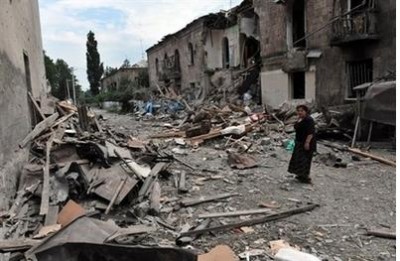
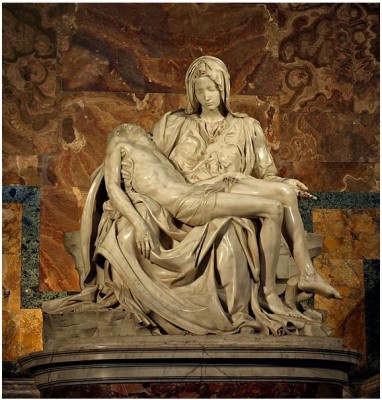
He warned against "more violent confrontations and retaliations, which may degenerate in a conflict of even larger scope".

To avoid this risk, "the International Community and the most inffuent countries" should "make every effort to support and promote .. initiatives" for a stable Peace, he stressed, shortly before his visit to France, where President Nicolas Sarkozy is the current EU chair.
"Together with our Orthodox brothers, we pray for these aims, and we entrust them to the intercession of her sanctity, virgin Mary, Mother of Jesus and of all Christians", he concluded.

Pope Benedict XVI spoke in front of more than 12.000 People during the Angelus of an Open-air Mass at Brixen-Bressalone (north of Italy), at the end of his short stay at the Alpes, close to German chancelor Angie Merkel's restplace, where he received the visits of two f.Italian Presidents, Ciampi and Cossiga, together with Minister Tremonti.
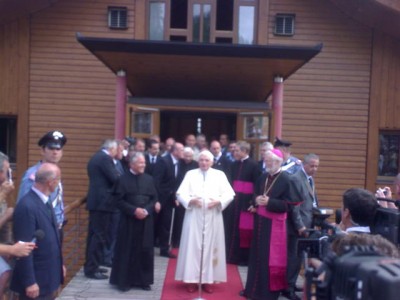
Pope's spokesman, Federico Lombardi, said ttesterday that he highlighted Brixen-Bressanone's synthesis, a peaceful and mutually enriching meeting point of many cultures, as "a model for Europe".
